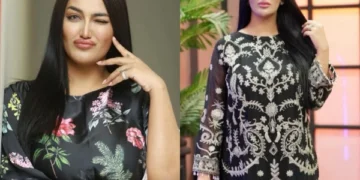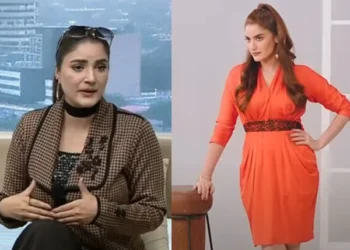Pakistani model and actress Saheefa Jabbar Khattak has made an impassioned plea for social media reform, calling out the dangerous, hateful, and toxic content being created and shared by young influencers and content creators. Through a series of strongly-worded Instagram Stories, the actress expressed deep concern over the growing culture of online bullying, classism, misogyny, and hatred—and questioned the direction in which society is heading.
Her emotional reaction has sparked discussions on digital ethics, the impact of social media on youth, and the role of influencers in shaping public behavior.
Raising Her Voice Against Online Hate Culture
Saheefa, who is known for her outspokenness on social issues, shared several disturbing video clips circulating on popular social media platforms. These videos, often created by so-called “content creators,” target individuals based on personal attributes such as name, caste, income level, skin complexion, clothing, and other socio-economic identifiers.
In one post, Saheefa wrote:
“Are we really part of a society where someone is judged just by looking at their name or caste? This is extremely sad.”
She emphasized that public shaming based on superficial judgments is not harmless entertainment—it’s harmful behavior that fosters division, prejudice, and intolerance.
Condemning Disrespect Toward Abuse Victims
A particularly alarming issue Saheefa highlighted was mockery of women who have been victims of harassment and abuse. She called out the misogynistic mentality that labels such women as “impure” or “dirty,” questioning how such regressive ideas still find space in the digital age.
Saheefa stated:
“What kind of content is this in which it is being said that if a woman is harassed, she becomes impure or dirty? This mentality is dangerous.”
Her comments reflect a wider concern about how victim-blaming and patriarchal attitudes are being normalized through viral videos—many of which are consumed by millions of young, impressionable viewers.
Criticizing Class-Based Content and Elitism
Saheefa also targeted another disturbing trend on social media—publicly flaunting wealth and mocking people for their financial limitations. She criticized videos where clothing prices are displayed as a way of defining social worth, noting that such practices reinforce class divisions and promote elitist mentalities.
According to her, wealth should not be the yardstick for measuring human value, and constantly portraying luxury lifestyles as the standard is damaging for the mental health and self-esteem of the broader public—especially young people from less privileged backgrounds.
The Call for Education Over Entertainment
Saheefa made a pointed remark, urging:
“God should take away the mobile phones from these children and teach them something.”
This was not just a reaction to the offensive videos she had seen—it was a commentary on the broader issue of youth spending excessive time on social media without guidance or education. She believes that without proper values and media literacy, technology becomes a weapon of harm rather than a tool for growth.
A Moment of Self-Reflection
Despite her criticism of others, Saheefa also took a moment to self-reflect and acknowledge her own imperfections. She ended her series of Instagram Stories with an apology to anyone she may have unintentionally hurt in the past.
“If I have ever hurt anyone in the past, I am ashamed.”
This humility resonated with many of her followers, showing that calling out bad behavior doesn’t mean claiming moral perfection—it means taking responsibility and encouraging collective improvement.
The Broader Issue: Social Media and the Rise of Toxic Content
While Saheefa’s reaction was sparked by specific viral clips, her outrage taps into a larger societal concern—the rapidly increasing influence of toxic content creators. In recent years, social media in Pakistan, like in many other countries, has seen:
- The glorification of materialism
- The normalization of body shaming and caste-based prejudice
- Casual misogyny in jokes and skits
- Public humiliation as a form of entertainment
- Spreading of false information and hate speech
These trends are not only harmful to the individuals being targeted but also shape public perception and values in dangerous ways, particularly for teenagers and young adults who are still developing their worldview.
The Role of Influencers and Responsibility
With the rise of TikTok, Instagram Reels, and YouTube Shorts, content creation has become accessible to millions. However, this democratization of media also means anyone can go viral without accountability.
Influencers wield enormous power to shape opinions, set trends, and normalize certain behaviors. But when popularity is prioritized over ethics, harmful trends spread unchecked.
Social activists have long argued that influencers should be held to ethical standards, especially when their content can have long-term psychological effects on viewers.
The Mental Health Impact of Online Hate
Psychologists warn that constant exposure to negative, judgmental, and elitist content can lead to:
- Low self-esteem
- Anxiety and depression
- Internalized classism or racism
- Desensitization to harassment and abuse
- Reinforcement of harmful gender norms
For abuse survivors, seeing their experiences mocked online can be retraumatizing. Saheefa’s condemnation of such videos aligns with calls from human rights organizations for stricter regulation of harmful digital content.
Public Reaction to Saheefa’s Statement
Her remarks have received widespread support from fans, activists, and even some fellow celebrities. Many praised her for using her platform to highlight the ethical crisis in Pakistan’s digital space.
However, some critics argued that restricting young people’s access to phones is not a practical solution. Instead, they suggested media literacy programs, parental guidance, and stronger content moderation as better long-term strategies.
Possible Solutions to Tackle Harmful Online Trends
Experts believe addressing toxic online culture requires a multi-pronged approach:
- Media Literacy Education – Teaching young people how to critically evaluate online content and recognize harmful narratives.
- Platform Accountability – Social media companies must enforce community guidelines and remove content promoting hate, harassment, or discrimination.
- Positive Role Models – Encouraging influencers to produce uplifting, educational, and inclusive content.
- Parental Involvement – Monitoring children’s online activities and guiding them toward healthier media consumption.
- Public Awareness Campaigns – National efforts to change societal attitudes toward bullying, misogyny, and classism.
Conclusion: A Wake-Up Call for the Digital Generation
Saheefa Jabbar Khattak’s bold stance is more than just a celebrity outburst—it’s a wake-up call for the entire society. In a world where viral videos can define trends and values, responsible content creation is no longer optional—it’s essential.
Her statement, “God, take away mobile phones from these children,” may have been emotional, but it reflects a deep frustration with how technology, instead of connecting us, is increasingly dividing and harming us.
If the current trajectory of toxic online culture continues, we risk normalizing prejudice, misogyny, and class discrimination for the next generation. Saheefa’s call to action reminds us that it’s time to rethink what kind of society we want our digital world to reflect—one that uplifts, educates, and unites, rather than one that mocks, divides, and destroys.

























